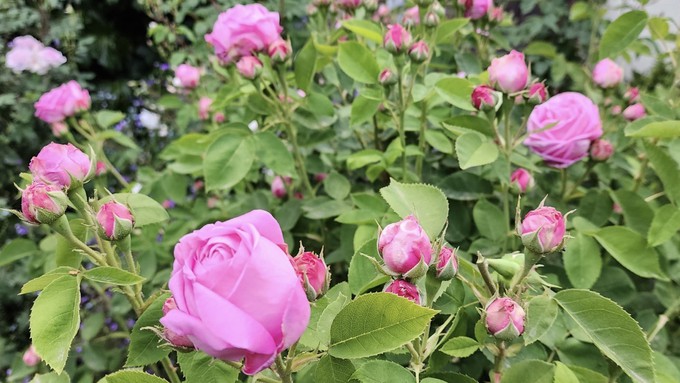
Sacramento Rose Society hosts auction; heritage rose expert holds yard sale

Among the roses for sale May 20 will be Barbara's Pasture Rose, named for the late Barbara Oliva, who found it. Photo courtesy Anita Clevenger
Love roses? Here are two great opportunities to add unusual (and often fragrant) varieties to your collection.
On Thursday, May 11 (and just in time for Mother’s Day), the Sacramento Rose Society will host an auction of hard-to-find rose varieties, propagated from members’ collections. Many of these miniature, miniflora and polyantha roses came from cuttings from Baldo Villegas’ rose “farm” (with 3,000-plus varieties and counting). In 1-gallon pots, all plants are at least two to three years old and grown on their own roots.
Starting at 7:30 p.m., the auction will be held at the club’s regular meeting at Shepard Garden and Arts Center, 3330 McKinley Blvd., Sacramento, in McKinley Park. Doors open at 7 p.m. Admission and parking are free.
Bidding starts at $15 for most bushes; cash or check only. Among the featured varieties will be Bees Knees, Gourmet Popcorn, Hello Gorgeous!, Irresistible, Joy, Magic Show, Show Stopper, The Lovely Fairy and Baldo Villegas (not the master rosarian, but his namesake white-pink blend miniflora).
Ideal for container gardening and borders, miniature, miniflora and polyantha roses tend to stay small, often under 2 feet. They’re ideal for rose lovers with less space and many also have fragrance.
Proceeds from the auction will help support the rose society and its programs, such as the just-completed rose show. For more information: https://sacramentorosesociety.org/.
For people who love fragrant – and historic – roses, here’s a fantastic opportunity: a yard sale of all antique roses. From 10 a.m. to 2 p.m. Saturday, May 20, heritage rose expert Anita Clevenger will host a sale of rare and historic roses at her home, 877 53rd St., Sacramento. Most roses will be priced at $15 with a few larger bushes priced at $25. Cash only please. More than 100 bushes in about 30 different varieties will be available.
Among the unusual roses that will be available are two favorites from the Heritage Rose Group: Barbara’s Pasture Rose and Elizabeth’s China Rose. In addition, find several varieties dating back to the 1800s.
Questions? Call Anita at 916-715-7294.
Comments
0 comments have been posted.Sacramento Digs Gardening to your inbox.
Food in My Back Yard Series
May 6: Maintain soil moisture with mulch for garden success
April 29: What's (already) wrong with my tomato plants?
April 22: Should you stock up on fertilizer? (Yes!)
April 15: Grow culinary herbs in containers
April 8: When to plant summer vegetables
April 1: Don't be fooled by these garden myths
March 25: Fertilizer tips: How to 'feed' your vegetables for healthy growth
March 18: Time to give vegetable seedlings some more space
March 11: Ways to win the fight against weeds
March 4: Potatoes from the garden
Feb. 25: Plant a fruit tree now -- for later
Feb. 18: How to squeeze more food into less space
Feb. 11: When to plant? Consider staggering your transplants
Feb. 4: Starting in seed starting
Sites We Like
Garden Checklist for week of May 11
Make the most of the lower temperatures early in the week. We’ll be back in the 80s by Thursday.
* Plant, plant, plant! It’s prime planting season in the Sacramento area. Time to set out those tomato transplants along with peppers and eggplants. Pinch off any flowers on new transplants to make them concentrate on establishing roots instead of setting premature fruit.
* Direct-seed melons, cucumbers, summer squash, corn, radishes, pumpkins and annual herbs such as basil.
* Harvest cabbage, lettuce, peas and green onions.
* In the flower garden, direct-seed sunflowers, cosmos, salvia, zinnias, marigolds, celosia and asters. (You also can transplant seedlings for many of the same flowers.)
* Plant dahlia tubers.
* Transplant petunias, marigolds and perennial flowers such as astilbe, columbine, coneflowers, coreopsis, dahlias, rudbeckia and verbena.
* Keep an eye out for slugs, snails, earwigs and aphids that want to dine on tender new growth.
* Feed summer bloomers with a balanced fertilizer.
* For continued bloom, cut off spent flowers on roses as well as other flowering plants.
* Add mulch to the garden to maintain moisture. Mulch also cuts down on weeds. But don’t let it mound around the stems or trunks of trees or shrubs. Leave about a 6-inch-to-1-foot circle to avoid crown rot or other problems.
* Remember to weed! Pull those nasties before they set seed.
* Water early in the day and keep seedlings evenly moist.